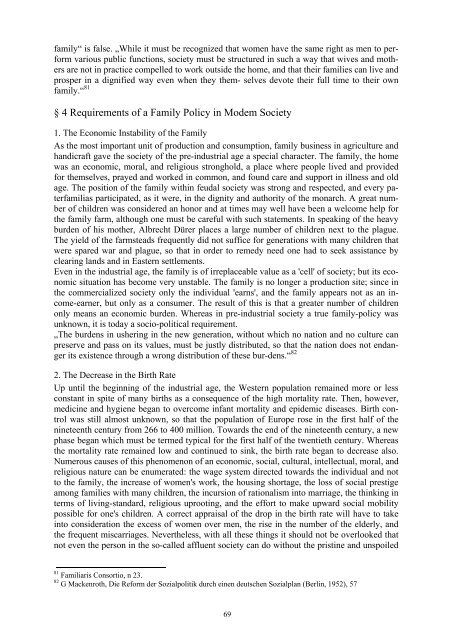Joseph Cardinal Höffner CHRISTIAN SOCIAL ... - Ordo Socialis
Joseph Cardinal Höffner CHRISTIAN SOCIAL ... - Ordo Socialis
Joseph Cardinal Höffner CHRISTIAN SOCIAL ... - Ordo Socialis
You also want an ePaper? Increase the reach of your titles
YUMPU automatically turns print PDFs into web optimized ePapers that Google loves.
family“ is false. „While it must be recognized that women have the same right as men to perform<br />
various public functions, society must be structured in such a way that wives and mothers<br />
are not in practice compelled to work outside the home, and that their families can live and<br />
prosper in a dignified way even when they them- selves devote their full time to their own<br />
family.“ 81<br />
§ 4 Requirements of a Family Policy in Modem Society<br />
1. The Economic Instability of the Family<br />
As the most important unit of production and consumption, family business in agriculture and<br />
handicraft gave the society of the pre-industrial age a special character. The family, the home<br />
was an economic, moral, and religious stronghold, a place where people lived and provided<br />
for themselves, prayed and worked in common, and found care and support in illness and old<br />
age. The position of the family within feudal society was strong and respected, and every paterfamilias<br />
participated, as it were, in the dignity and authority of the monarch. A great number<br />
of children was considered an honor and at times may well have been a welcome help for<br />
the family farm, although one must be careful with such statements. In speaking of the heavy<br />
burden of his mother, Albrecht Dürer places a large number of children next to the plague.<br />
The yield of the farmsteads frequently did not suffice for generations with many children that<br />
were spared war and plague, so that in order to remedy need one had to seek assistance by<br />
clearing lands and in Eastern settlements.<br />
Even in the industrial age, the family is of irreplaceable value as a 'cell' of society; but its economic<br />
situation has become very unstable. The family is no longer a production site; since in<br />
the commercialized society only the individual 'earns', and the family appears not as an income-earner,<br />
but only as a consumer. The result of this is that a greater number of children<br />
only means an economic burden. Whereas in pre-industrial society a true family-policy was<br />
unknown, it is today a socio-political requirement.<br />
„The burdens in ushering in the new generation, without which no nation and no culture can<br />
preserve and pass on its values, must be justly distributed, so that the nation does not endanger<br />
its existence through a wrong distribution of these bur-dens.“ 82<br />
2. The Decrease in the Birth Rate<br />
Up until the beginning of the industrial age, the Western population remained more or less<br />
constant in spite of many births as a consequence of the high mortality rate. Then, however,<br />
medicine and hygiene began to overcome infant mortality and epidemic diseases. Birth control<br />
was still almost unknown, so that the population of Europe rose in the first half of the<br />
nineteenth century from 266 to 400 million. Towards the end of the nineteenth century, a new<br />
phase began which must be termed typical for the first half of the twentieth century. Whereas<br />
the mortality rate remained low and continued to sink, the birth rate began to decrease also.<br />
Numerous causes of this phenomenon of an economic, social, cultural, intellectual, moral, and<br />
religious nature can be enumerated: the wage system directed towards the individual and not<br />
to the family, the increase of women's work, the housing shortage, the loss of social prestige<br />
among families with many children, the incursion of rationalism into marriage, the thinking in<br />
terms of living-standard, religious uprooting, and the effort to make upward social mobility<br />
possible for one's children. A correct appraisal of the drop in the birth rate will have to take<br />
into consideration the excess of women over men, the rise in the number of the elderly, and<br />
the frequent miscarriages. Nevertheless, with all these things it should not be overlooked that<br />
not even the person in the so-called affluent society can do without the pristine and unspoiled<br />
81 Familiaris Consortio, n 23.<br />
82 G Mackenroth, Die Reform der Sozialpolitik durch einen deutschen Sozialplan (Berlin, 1952), 57<br />
69















